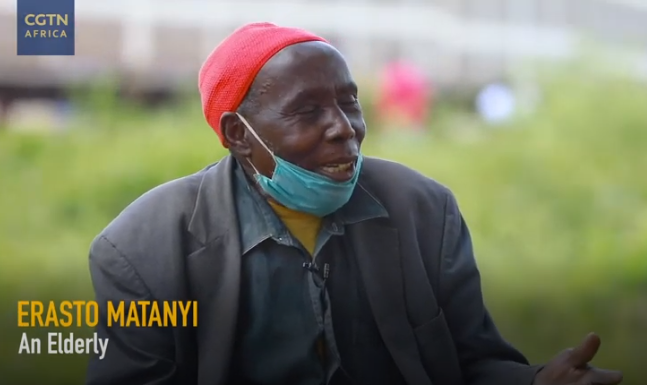
COVID-19’s impact on the elderly
Kenya’s Centers for Disease Control and Prevention says that older adults and people of any age who have serious underlying medical conditions might be at higher risk for severe illness from COVID-19.
75-year-old Erasto Matanyi is among those considered as high risk. He looks frail but he can move around.

“At this stage in life, we have various conditions, we go through pain all over our bodies. When you go to the hospital, you cannot be treated because you don’t have finances and the treatment is expensive.”
Health authorities globally have issued directives for the elderly to remain indoors and be secured against the pandemic.
But for Matanyi, who resides in Kibra, one of the biggest slums in Kenya, those directives don’t make sense. He says he cannot stay indoors to follow those guidelines that were issued by the government in line with protecting the elderly against COVID-19.
“We are told to stay in our houses, but we do not have anything to eat in there. We are forced to go out sometimes to borrow from our neighbors or look for some menial jobs to do in order to make ends meet.”
Matanyi makes a little money working as a security guard but he says those opportunities are drying up and he fears the grandchildren he provides for will go hungry.
In June, over 100 elderly persons congregated in Kibra where they voiced their day to day challenges. Most of them saying that the government has not done enough to help them especially now.
Some submitted that they need to be relocated from the city and into elderly homes across the country where they can be taken care of to avoid pain caused by the pandemic.
Lissen Mogaka, from the Ministry of Social Protection, is trying to help. His office maps out different regions where elderly people like Matanyi live.
Once those individuals are located, the ministry sets them up in a program where elderly citizens can receive a monthly stipend to sustain themselves. Mogaka says the program was in existence before the COVID-19 pandemic.
“We are using regional officers who are at the grassroots level to disburse funds meant to cushion the elderly especially those who are 70 years old and above. We encourage them to register with county officials for them to receive help now and for years to come.”
The ministry of social protection says it wants to increase the effectiveness and efficiency of its social protection programs while continuing to scale up coverage.
However, according to those fighting for the rights of the older adults, they say, the majority of elderly citizens have not received food donations or cash stipends to help them eat healthy to fight diseases like COVID-19.

Tom Oketch, Executive Director of the La Vie Foundation, is also championing the well-being of senior citizens. He says there are thousands of seniors who need help from the government as they cannot sustain themselves and they lack a lot of basic things like proper healthcare, food, water and shelter.
Oketch crisscrosses the capital, engaging with authorities to save the elderly and shield them against all manner of conditions that they are grappling with. He however adds that they face a daunting task of getting finances to run these programs.
Moses Mwangi is one of the fortunate senior citizens.
Mr. Mwangi, who has been undergoing treatment of Hodgkin’s lymphoma, says he was enlisted by the government early this year among those people who deserve a periodic stipend.
“I hope that all the elderly people can be enlisted to receive help since most of us are in need of it,” he says.
Mwangi receives Ksh 2,000($20) every two weeks.






